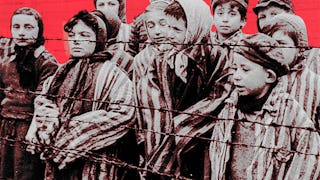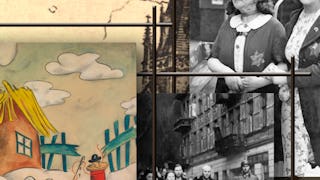In this new online video course produced by EHRI, the European Holocaust Research Infrastructure, we will explore diaries, photographs, official Nazi documents, postwar survivor testimonies and much more - all together with leading scholars in the field. We will become acquainted with original documents and gain hands-on experience in using them while learning about their importance, and the unique perspectives they provide us into this cataclysmic event.


Détails à connaître

Ajouter à votre profil LinkedIn
Découvrez comment les employés des entreprises prestigieuses maîtrisent des compétences recherchées


Obtenez un certificat professionnel
Ajoutez cette qualification à votre profil LinkedIn ou à votre CV
Partagez-le sur les réseaux sociaux et dans votre évaluation de performance

Il y a 6 modules dans ce cours
Welcome to the online course "'It Must All Be Recorded Without a Single Fact Left Out': The Holocaust through the Perspective of Primary Sources" for EHRI, the European Holocaust Research Infrastructure. Yad Vashem is one of 26 EHRI partners, and tasked with creating and operating the course. In this first short week, we will introduce the subject of Holocaust research and study using primary sources, including some of the main issues within this domain.
Inclus
4 vidéos4 lectures2 sujets de discussion
This week, we will learn about researching and studying the Holocaust using diaries as unique historical sources. We will demonstrate these through the diaries of Adam Czerniakow and Emanuel Ringelblum, among others.
Inclus
13 vidéos1 lecture2 sujets de discussion
This week, we will learn about the use of photographs and images as tools in documenting and commemorating the Holocaust, and as historical sources, through the photographs of two photographers active in the Lodz Ghetto: Walter Genevein, a Nazi official, and Mendel Grossman, a Jew incarcerated in the ghetto.
Inclus
6 vidéos2 lectures2 sujets de discussion
This week, we will learn about researching and studying the Holocaust using German bureaucratic sources. We will focus on four German bureaucratic source types relating to specific aspects and stages of the Holocaust: Situation Reports; documents on the confiscation of Jewish property; Einsatzgruppen reports; and documents on the deportation process.
Inclus
12 vidéos2 lectures1 sujet de discussion
This week, we will learn about researching and studying the Holocaust using personal letters written immediately after liberation. We will examine such letters' significance in Holocaust research and studies, the motives of their writers, and their main themes.
Inclus
8 vidéos2 lectures1 sujet de discussion
This week, we will learn about researching and studying the Holocaust using testimonies of survivors. These testimonies include early accounts submitted closer to the time of the events themselves, as well as later ones. We will explore questions and arguments regarding the use of testimonies as historical sources, their significance, and the invaluable perspective they offer, especially concerning topics where other source types are lacking.
Inclus
7 vidéos2 lectures1 évaluation par les pairs2 sujets de discussion
Instructeur

Offert par
En savoir plus sur History


Tel Aviv University


University of California, Santa Cruz


Yad Vashem
Pour quelles raisons les étudiants sur Coursera nous choisissent-ils pour leur carrière ?





Ouvrez de nouvelles portes avec Coursera Plus
Accès illimité à 10,000+ cours de niveau international, projets pratiques et programmes de certification prêts à l'emploi - tous inclus dans votre abonnement.
Faites progresser votre carrière avec un diplôme en ligne
Obtenez un diplôme auprès d’universités de renommée mondiale - 100 % en ligne
Rejoignez plus de 3 400 entreprises mondiales qui ont choisi Coursera pour les affaires
Améliorez les compétences de vos employés pour exceller dans l’économie numérique
Foire Aux Questions
Access to lectures and assignments depends on your type of enrollment. If you take a course in audit mode, you will be able to see most course materials for free. To access graded assignments and to earn a Certificate, you will need to purchase the Certificate experience, during or after your audit. If you don't see the audit option:
The course may not offer an audit option. You can try a Free Trial instead, or apply for Financial Aid.
The course may offer 'Full Course, No Certificate' instead. This option lets you see all course materials, submit required assessments, and get a final grade. This also means that you will not be able to purchase a Certificate experience.
When you purchase a Certificate you get access to all course materials, including graded assignments. Upon completing the course, your electronic Certificate will be added to your Accomplishments page - from there, you can print your Certificate or add it to your LinkedIn profile. If you only want to read and view the course content, you can audit the course for free.
You will be eligible for a full refund until two weeks after your payment date, or (for courses that have just launched) until two weeks after the first session of the course begins, whichever is later. You cannot receive a refund once you’ve earned a Course Certificate, even if you complete the course within the two-week refund period. See our full refund policy.
Plus de questions
Aide financière disponible,



